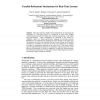Free Online Productivity Tools
i2Speak
i2Symbol
i2OCR
iTex2Img
iWeb2Print
iWeb2Shot
i2Type
iPdf2Split
iPdf2Merge
i2Bopomofo
i2Arabic
i2Style
i2Image
i2PDF
iLatex2Rtf
Sci2ools
114
Voted
FASE
2000
Springer
2000
Springer
Parallel Refinement Mechanisms for Real-Time Systems
This paper discusses highly general mechanisms for specifying the refinement of a real-time system as a collection of lower level parallel components that preserve the timing and functional requirements of the upper level specification. These mechanisms are discussed in the context of ASTRAL, which is a formal specification language for real-time systems. Refinement is accomplished by mapping all of the elements of an upper level specification into lower level elements that may be split among several parallel components. In addition, actions that can occur in the upper level are mapped to actions of components operating at the lower level. This allows several types of implementation strategies to be specified in a fairly natural way, while the price for generality (in terms of complexity) is paid only when necessary. The refinement mechanisms are illustrated using a simple digital circuit and a much more complex example is sketched.
Related Content
| Added | 24 Aug 2010 |
| Updated | 24 Aug 2010 |
| Type | Conference |
| Year | 2000 |
| Where | FASE |
| Authors | Paul Z. Kolano, Richard A. Kemmerer, Dino Mandrioli |
Comments (0)

